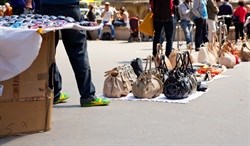
Reports[1] show that as the global trade in counterfeit goods is growing, Africa is increasingly being targeted as a market for counterfeit merchandise. A new trend has also emerged that Africa is being used as a transit route for fake goods, which also poses an indirect threat to European and American markets.
African nations are therefore becoming increasingly aware of challenges that counterfeit trade represents to their economies and their citizens, and becoming active in the fight against it.
Government officials, law-enforcers and representatives of ministries responsible for anti-counterfeiting, are gathering at the summit to discuss consumer protection and raise awareness against illegitimate goods. Here, HP will outline how to fight counterfeiting, and look specifically at how policy makers can toughen applicable laws and enforcement capacity across Africa.
"The HP Anti-counterfeiting Programme works hard to protect partners and customers, but this is only made possible through close collaboration with law enforcers around the world," says Fabrice Campoy, Printing and Personal Systems Africa director.
"False goods impact businesses and global trade through lost revenue, damage to brands and the negative effects on hard-earned reputation and consumer confidence," says Jeff Kwasny, Brand Protection Programme manager for HP's Printing and Personal Systems group. "At the 2014 Anti-Counterfeiting Africa Conference, we are bringing together those most affected by counterfeits in the region - from policy makers to brands like Unilever and Nike - so we can work towards tackling this criminal activity together".
Across the EMEA region, over the last five years (2009 through 2013), HP has conducted around 1,600 investigations, resulting in about 1,300 enforcement actions (raids and seizures by authorities) and around 11 million units of counterfeit products and components seized, thus preventing them from being sold in the EMEA marketplace and beyond.
The Programme has also overseen around 4,000 unannounced inspections of HP products at the warehouses of HP Channel Partners across EMEA in the past five years (2009 through 2013), to verify that they are not selling counterfeit products to their customers.
Through its Anti-counterfeiting Programme, HP actively educates its customers and partners to be vigilant against fake printing supplies. It also cooperates closely with local and global law enforcement authorities to detect and dismantle illegal operations that produce counterfeit HP printing components.
For more, go to ww.hp-acf-africa-conference2014.com.
[1] Based on report from South African-based research and strategy firm Consultancy Africa Intelligence (CAI), entitled "The trade in counterfeit goods: What is it, why is it a problem and what is its impact on Africa?"